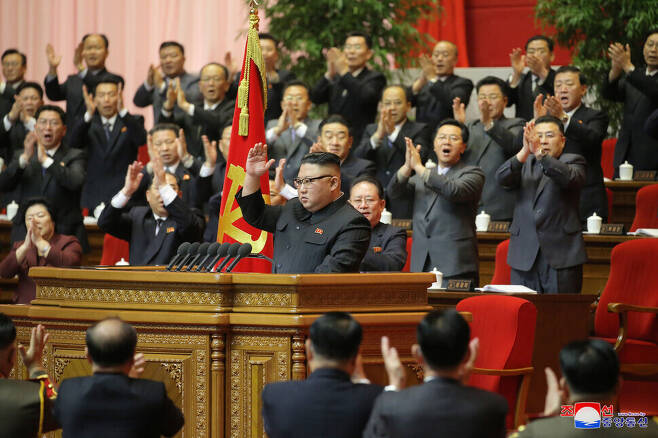[Editorial] US, North and South Korea must not miss window of opportunity for inter-Korean peace in 2021
이 글자크기로 변경됩니다.
(예시) 가장 빠른 뉴스가 있고 다양한 정보, 쌍방향 소통이 숨쉬는 다음뉴스를 만나보세요. 다음뉴스는 국내외 주요이슈와 실시간 속보, 문화생활 및 다양한 분야의 뉴스를 입체적으로 전달하고 있습니다.

North Korea devoted most of the final hours of the 8th Congress of the Workers’ Party of Korea (WPK), which wrapped up on Jan. 12, to building a socialist economy through “self-sufficiency” and a “frontal breakthrough.”
Since the WPK Congress was held amid the triple threat of international sanctions, COVID-19, and flood damage, it makes sense that the North’s greatest priority would be overcoming its economic crisis.
But the international community had hoped that North Korea would have conveyed a message about relations with South Korea and with the US, with Joe Biden on the verge of being inaugurated as the next American president. In his report to the WPK Congress, Kim Jong-un, who has now been elected WPK general secretary, described the US as “our principal enemy,” but he didn’t raise the possibility of any shows of force, such as resuming long-range missile tests.
Instead, Kim said the North would calibrate its actions to the North Korean policy adopted by the Biden administration and by South Korea. In effect, that puts the ball in Seoul and Washington’s court.
We believe that it’s critical for the US to make a quick and appropriate response. If the Biden administration focuses on pressing domestic issues early on — including COVID-19, the economic recovery, and the impeachment of outgoing president Donald Trump — and follows standard procedure in staffing its North Korean policy, the first half of 2021 could pass by with little accomplished.
That could lead North Korea to pressure the US by creating a crisis situation on the Korean Peninsula through nuclear activity and missile launches. If South Korea and the US start their joint military exercises in March, the North is likely to give a military response, considering that it regards those exercises as the preeminent example of the US’ “policy of hostility.”
In a Jan. 12 report that summarized interviews with 43 experts on South Korea and the US, the Korea Economic Institute of America (KEI) said that the Biden administration should take quick action on North Korea so as to prevent a crisis from occurring, even if it has other urgent matters to attend to. The report also recommended that Biden, after his inauguration, appoint an envoy that North Korea can trust and that South Korea and the US make a public proposal, detailing what they want from the North.
Given the limited time left in Moon Jae-in’s presidency, the first half of this year may be the best time to orchestrate a breakthrough in inter-Korean relations and in North Korea-US relations. Rather than simply waiting for the Biden administration to set its North Korea policy, Seoul ought to take action to repair inter-Korean relations.
In particular, we hope that South Korea and the US will quickly reach an understanding about what to do with their joint military exercises in March. If North Korea participates in the Tokyo Olympics in July, it could restart the Korean Peninsula peace process — just as with the 2018 Pyeongchang Olympics.
North Korea also needs to patiently wait for South Korea and the US to make an offer. Self-reliance and self-sufficiency won’t help North Korea break out of its “continuing difficulties, which are worse than ever before,” to quote the opening speech at the WPK Congress. We hope that North Korea will actively accept humanitarian aid from South Korea and engage in economic cooperation with it.
Please direct comments or questions to [english@hani.co.kr]
Copyright © 한겨레. 무단전재 및 재배포 금지.
- ‘정인이 양모’ 반박한 법의학자들 “그 통증, 울지도 못할 정도”
- 이언주 ‘악수+15분 연설’…집합금지 위반에 코로나 늑장검사
- ‘동학개미 멘토’ 강방천 “부동산 중심 자산, 흔들리는 계기 될 것”
- 탈모가 끝이 아니었어…코로나 후유증 ‘딱딱한 폐·피로감’
- 8초만 공개했는데 최고상 받은 LG 롤러블폰, 왜?
- ‘포용’과 ‘여론’ 사이…문 대통령의 ‘사면 방정식’ 해법은?
- 헬스장·노래방 영업해도 ‘5인 이상 사적 모임 금지’ 연장될 듯
- ‘1초에 원자폭탄 4개’ 폭발열 수준…바닷물 온도 사상 최고
- 박근혜 유죄 확정한 날, 조응천 ‘정윤회 문건 유출’ 무죄 확정
- 아릿하고 폭신해서 매력적, 그래서 더 위험한 ‘설산’